|
October 1, 2020 - No. 66
October 8 Day of Action on Long-Term Care in Ontario
Support the Demands for Immediate Improvement of Conditions
• The Issue Before Us - Steve Rutchinski
• Ontario Nurses' Association Communiqué
• Registered Nurses Demand Minimum Nursing Home Basic Care Standards
Health Care Workers Uphold Their Rights
• Alberta Nurses Demand Restoration of Special Leave Provisions
- Peggy Morton
Postal Workers Continue to Fight for the Rights of All
• Serious Concerns about Health and Safety - Interview, Alain
Robitaille
October 8 Day of Action on Long-Term Care in Ontario
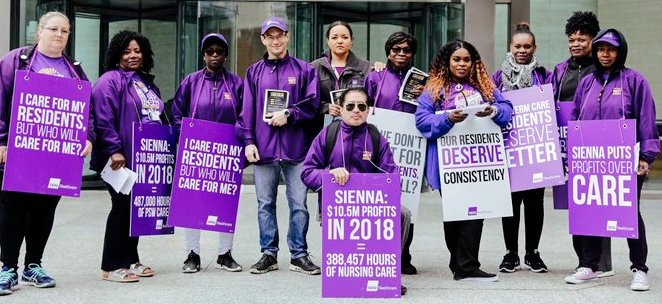
Action by long-term care workers, July 3, 2020.
The Ontario Health Coalition (OHC) together with frontline care and
elder care advocacy organizations are holding a Day of Action on
Long-Term Care in Ontario on October 8 at 11:00. Seventeen cities have
announced events as of September 30. With close to 2,000 deaths of
residents and staff in Ontario long-term care facilities since
April, a second wave officially underway and precious little done to
remedy the conditions that claimed the lives of so many, Workers' Forum calls on everyone to go all out in support of the OHC's demands for immediate action.
The OHC is calling for immediate action by the Ford government to
recruit and train staff, improve pay and working conditions and provide
full-time work and to implement a minimum care standard of four hours
of hands-on care per resident per day. These are all critical demands
for the care of patients and well-being of caregivers.
In keeping with current public health restriction of a maximum of 25
people for outdoor gatherings, the Day of Action will take the form of
motorcades and press conferences. Participants are asked to be in
their cars and make themselves visible by affixing signs and decorating
your car (safely) with messages about the need to improve
long-term care and make it public.
People are asked to contact their local health coalition to confirm
attendance. More events are being organized every day. Visit the Ontario Health Coalition website for updates.
To see the up-to-date list of sponsoring organizations and endorses, click here.

- Steve Rutchinski - As a society we have a social duty of care to our seniors and for
those who work as caregivers. We have a duty to correct the situation in
long-term care that left so many warehoused, lacking adequate standards
of care and vulnerable to a virus that ultimately claimed their lives.
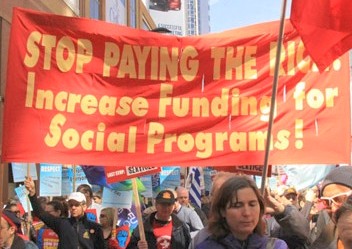 The
overwhelming majority of deaths occurred in for-profit homes operated
by large monopolies in the long-term care "business." It was already
known that the neo-liberal agenda of privatization, cuts to funding,
understaffing and unsustainable workloads, wages and working
conditions set the stage for a disaster. That reality was covered
up with a hoax perpetrated by successive governments that conditions
were being
appropriately monitored. The situation in long-term care had been
detailed in government sponsored studies, inquest findings, reports by
organizations of frontline caregivers and more, all of which were
ignored. The
overwhelming majority of deaths occurred in for-profit homes operated
by large monopolies in the long-term care "business." It was already
known that the neo-liberal agenda of privatization, cuts to funding,
understaffing and unsustainable workloads, wages and working
conditions set the stage for a disaster. That reality was covered
up with a hoax perpetrated by successive governments that conditions
were being
appropriately monitored. The situation in long-term care had been
detailed in government sponsored studies, inquest findings, reports by
organizations of frontline caregivers and more, all of which were
ignored.
Today, one of the demands of caregivers and seniors' advocacy
organizations is for an end to for-profit delivery of this essential
service. It has been shown beyond any doubt that those who reap profit
from long-term care put their narrow interests ahead of the well-being
and lives of our seniors.
These long-term care monopolies are paid from the public purse for
every licensed bed. They are subsidized with public funds, to open new
beds or refurbish existing facilities. Homes owned by these monopolies
were most likely to have cramped living conditions with up to four
residents to a room, a significant factor in the spread of COVID-19.
These monopolies have refused to upgrade their facilities to comply
with standards put in place 22 years ago, and have been exempted from
compliance. Now the government will pay them to comply. In July, for
example, the Ontario government allocated another $1.75 billion over
the next five years to expand and refurbish long-term care operations.
The bulk of
funding, which will be made retroactive to projects dating back to
2018, will go to these very same for-profit monopolies where so many
seniors died. It is unconscionable.
The essence of neo-liberalism is that society is organized to pay the
rich. That's what led to privatization of public services like
long-term care, abandoning standards of care and lowering the wages,
working and living conditions of caregivers. That's what gave rise to
legislation like Bill 124 which imposes a three-year wage freeze on
public
employees, Bill 195 which overrides collective agreements of frontline
health care workers -- all this and more is done in order that society
pay the rich.
A new direction is needed for society. We owe it to our seniors, our
youth, ourselves. The issue before us is to Stop Paying the Rich!

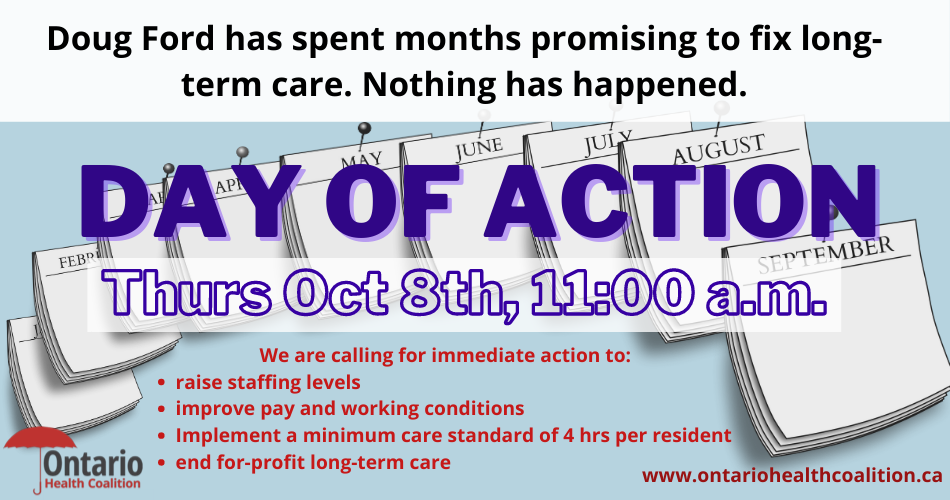
In the last five months, nearly 2,000 residents and staff have
died as a result of COVID-19 in our province's long-term care homes.
Many died isolated, without adequate care and without staff time for
emotional support. Long-term care staff have had to fight for access to
appropriate personal protective equipment (PPE) and have worked in
crisis-level staffing shortages that have only become worse during the
pandemic. In Canada, we have seen the highest levels of death in
long-term care homes in the developed world.
The Ford government has taken no action to deal with emergency
staffing shortages and inadequate care levels in long-term care homes.
Despite repeated promises, no action has been taken to get care levels
up to a safe standard. In Ontario, the majority of COVID-19 related
deaths happened in for-profit long-term care homes, yet privatization
of new long-term care beds continues.
Today [September 25], COVID-19 continues to run through long-term
care homes. In recent weeks, 11 residents have died at just one home.
Yet, there is no plan to get staff into hard-hit homes. Long-term care
staff are also still fighting to get the appropriate PPE. All staff do
not have N95 masks.
As of last week, there were 35 long-term care homes in the province
with active COVID-19 outbreaks. This cannot go on any longer.
The Ontario Health Coalition (OHC) is asking Ontarians to take
action and to stop accepting empty promises from our provincial
government.
The OHC is calling for:
- Immediate action by the Ford government to recruit & train
staff, improve pay and working conditions and provide full-time work.
Quebec's and BC's governments have already done this. There is no excuse
for further delay. The conditions of work are the conditions of care.
- The Ford government to implement a minimum care standard of 4-hours of hands on care per resident per day.
- Both our federal and provincial governments to end for-profit long-term care, starting by making Revera public.

Following the federal Speech from the Throne, the Registered
Nurses' Association of Ontario (RNAO) called on the federal government
to model long-term care standards on the Minimum Nursing Home Basic Care
protocols developed by RNAO, protocols the Ontario government continues
to ignore.
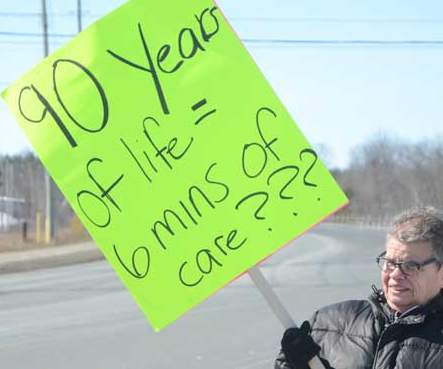 RNAO's minimum standard of care would ensure that each long-term care
home provide a minimum of four worked hours of direct nursing and
personal care for each resident per 24 hours, according to the following
staff mix formula: RNAO's minimum standard of care would ensure that each long-term care
home provide a minimum of four worked hours of direct nursing and
personal care for each resident per 24 hours, according to the following
staff mix formula:
- a minimum of 48 minutes of worked hours of direct care from a registered nurse (RN)
- a minimum of 60 minutes of direct care from a registered practical nurse (RPN) or licensed practical nurse (LPN)
- a minimum of 132 minutes of direct care from a personal support worker (PSW)
It also set out minimum staffing requirements, including: one
full-time equivalent (FTE) nurse practitioner (NP) per 120 residents;
one FTE nursing staff member (preferably an RN) to support the functions
of infection prevention and control, quality improvement, staff
education, onboarding and orientation; mandate that staff (RN, RPN/LPN,
PSW) only work in one long-term care home; ensure salaries for nurses
and personal support workers in long-term care are commensurate with
those paid to health workers in other sectors, such as hospitals; and
ensure full-time employment with benefits is offered to staff who want
full-time work, enabling continuity of care for residents and
improved staff retention.

Health Care Workers Uphold Their Rights
- Peggy Morton - The United Nurses of Alberta (UNA) is calling on the Alberta
government to restore special paid leave for health care workers who
must self-isolate due to COVID-19. The government cancelled the
temporary paid leave on July 6. At that time, both total cases and
hospitalizations of patients with COVID-19 had been rising for
approximately one month, and there was a major outbreak at the
Misericordia Hospital in Edmonton. At Foothills Medical Centre in
Calgary, staff are battling outbreaks in six units, with 33 patients
and 28 health care workers positive for COVID-19, four deaths, and 290 health
care workers in isolation. There are also outbreaks at the Queen
Elizabeth II Hospital in Grande Prairie and the Royal Alexandra
Hospital in Edmonton. Three long-term care and twelve supportive living
and seniors' residences in Alberta currently have outbreaks. However
the Kenney government has taken no action to restore special leave
provisions.
"Nurses who are required to self-isolate because of outbreaks in
hospitals and long-term care centres are being forced to use sick leave
days or take a financial hit," UNA Director of Labour Relations David
Harrigan said. "Regular employees are running through their sick leave
banks and casual nurses don't have access to sick leave, so they
are losing income," he said.
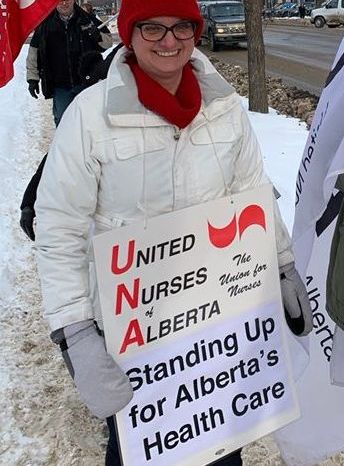 Harrigan called on the government to restore isolation sick pay,
noting that nurses could be assigned to do work they can perform while
in isolation, and receive sick pay when this is not possible. "Nurses
are on the frontlines of the COVID-19 pandemic everyday and are feeling
extremely misused and disrespected," he said. Harrigan called on the government to restore isolation sick pay,
noting that nurses could be assigned to do work they can perform while
in isolation, and receive sick pay when this is not possible. "Nurses
are on the frontlines of the COVID-19 pandemic everyday and are feeling
extremely misused and disrespected," he said.
Along with Alberta Health Services' (AHS) renewed focus on
"attendance awareness" and "vacancy management" programs, UNA is
concerned nurses will be pressured to report to work even if they are
feeling ill during the pandemic. The so-called attendance awareness
program is intended to pressure workers not to use their sick time. The
vacancy management program "manages" vacancies by not filling them,
which results in nurses being forced to work short staffed and to take
on additional shifts and overtime.
"Workers, especially health care workers, should never be pushed to
work when they feel sick," UNA First Vice-President Danielle Larivee
stated. "But this is exactly what AHS is doing by renewing emphasis on
an employee 'attendance awareness' program in the middle of the
continuing coronavirus pandemic. This is inappropriate and
dangerous. The dangers of this approach during a global pandemic should
be obvious to everyone, " Larivee said.
"Even during a normal flu season it is irresponsible to create an
environment where employees feel obliged to report to work; during a
pandemic the effects are exponential," Harrigan said. "For those who are
already struggling financially this is a further disincentive to remain
at home in the face of mild symptoms."
The stand of the nurses is just and deserves the active support of
all Albertans. Health care workers are not a "cost" but the essential
factor in the delivery of services. To suggest that sick leave for
health care workers, who even in normal times face the risk of exposure
to contagious disease, workplace injuries, the stress of working
understaffed, as well as potentially transmitting illness to those they
care for, is a "cost" reflects the outlook of a spent force incapable and
indifferent to the well-being of both the nurses and other health
care workers and those they care for. To speak of those who risk their
lives every day to care for their patients as a "cost" and to exert
pressure on
them to act in a manner that violates their rights and endangers the
sick and elderly in their care is contemptible beyond words.
Further, programs like "attendance awareness" are imposed
by executive decree and used not only to attack workers but to force
the frontline managers to violate their own conscience and take actions
which they know violate their professional responsibilities towards
staff, patients, and residents.
What is revealed is the need for a public authority where the health
care workers play a decisive role and their initiative, expertise,
knowledge, and sense of responsibility guide decision-making and decide
what resources are needed for them to do their work.

Postal Workers Continue to Fight for the Rights of All
- Interview, Alain Robitaille - Alain Robitaille is President of the Montreal Local of the Canadian Union of Postal Workers (CUPW).
Workers' Forum: The Montreal Local of CUPW reports a
specific concern at this time about the health and safety of postal
workers. Can you tell us more?
Alain Robitaille: The holiday season is just around the
corner for postal workers. We will see how the health and safety
measures that have been adopted at the post office will hold up during
the holiday rush. Holiday season is complex at the best of times. Now
imagine that the employer is concerned about a loss of
productivity due to physical distancing and from people being absent from
work. How will things unfold?
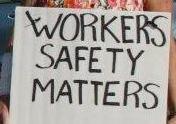 As soon as the pandemic began, Canada Post put in place, fairly
quickly, the preventive withdrawal of all people who are at risk, paid
at 100 per cent of their wage, under a clause in the collective
agreement that covers a quarantine situation. As soon as the pandemic began, Canada Post put in place, fairly
quickly, the preventive withdrawal of all people who are at risk, paid
at 100 per cent of their wage, under a clause in the collective
agreement that covers a quarantine situation.
Now we see that the employer is looking at the statistics, at the
columns of figures, and realizes that these safety measures are
expensive.
We seriously oppose what Canada Post is doing now. They have sent a
form to workers who are on preventive leave which they are to submit to
their doctor. The goal is to find out what their health status is,
whether they can return to work or have to stay home because they are at
risk. There
are only two questions on the form. The first question is "Has your
patient been diagnosed with an underlying medical condition that the
Public Health Agency of Canada considers at risk for developing severe
complications from COVID-19? Yes or no." In cases where workers
are immunosuppressed and have very precarious health conditions, the
question is quite simple. The answer is yes. The
second question is: "Do you recommend that your patient self-isolate
for medical reasons? Yes or no." This is more complex for the doctor.
It is not a simple question with a yes or no answer. Public health
authorities say it is important for people not to be totally isolated
at home, that it's important to take walks, for example. And people
also have to provide for their basic needs, such as groceries. Of
course you can have those delivered but there are costs, it's not
accessible for everyone, and there are people who don't trust the
process of having groceries delivered by someone who has handled all
the products. There is reluctance to do that. It is to be noted that
the French form has the phrasing "at home" regarding self-isolation in
the second question while the English form does not include that
phrase. So, besides anything else, the two forms are not even exactly
the same. Many doctors answered "no" to the second question, that they do not recommend that their patients isolate themselves at home.
These are the only questions that are asked. No questions such as "Do
you feel your patient is fit to return to work and, if so, what do you
recommend in terms of how this should take place?"
We are talking about people with precarious health. This can include
people who are undergoing chemotherapy, people who are HIV-positive,
people who have heart disease, and so on. We have 55,000 members across
the country, including 6,000 in Montreal. Imagine very complex health
situations that are decided by the employer via a form
that includes only two questions, without putting into context, for example,
what isolation at home means.
Many of our workers have submitted this form to their doctor who
filled it out. There are doctors who answered "yes" to the first
question but "no" to the second, that they do not recommend complete
isolation even though their patient is at risk. Some made comments. For
example, that the worker could go back to work if there is a two-metre
distance between people, if the worker wears a mask, if everyone wears a
mask, etc. There are some doctors who elaborated on their answer which
gave context to their opinion that the worker could return to work.
The union had to confront the employer because the employer was
returning all these workers back to work without even telling us. We
have a duty to participate in the accommodation of our workers and we
firmly believe that it is our duty to intervene in this matter. Health
and safety is a union duty. We intervened forcefully, we sent
workers home because we didn't have time to discuss how to bring them back
to work.
WF: How are workers contacted once Canada Post receives the doctor's form?
AR: They are contacted directly by the employer. They
are contacted by an immediate supervisor. The supervisor is in a
position of authority and their mandate is to get the person back to
work. According to the supervisor's interpretation, everything is fine
and the worker can come back even if they are at risk.
The work that we have done with the employer after the fact to
determine what accommodation measures have been put in place to protect
the worker tells us that they brought workers back very hastily, workers
who needed specific accommodations and who cannot just be told that
Canada Post has a policy of physical distancing. The problem
is much broader than that.
The situation becomes very complex when the doctor simply answers
"yes" or "no" -- yes the person is at risk, and no, isolation at home is
not recommended, without any comment. In Montreal, we have about 70
people in this situation. In the union's opinion, the employer has no
business saying that the doctor has authorized the person's
return to work since they did not ask that question and the doctor has
not given his or her opinion on whether the worker should return and
under what conditions.
The employer argues that it cannot ask the physician whether the
worker is fit to return because it was not the doctor who told the
worker to be off work in the first place. Clearly, the form is
insufficient and is being used to draw unwarranted conclusions.
They have brought many workers back this way, over 70 in Montreal. We
have asked for the list of these people and the employer refuses to
give it to us. We are not giving up. We are taking this issue to the
national level. It is a struggle that is dignified and necessary.
Moreover, although the employer asked for doctors' answers to the
two questions, workers were called back to work no matter what answers
their doctor gave. Let's take a typical case where the doctor had said
yes, return to work could lead to serious consequences in the case of a
COVID-19 infection and yes, the worker should self isolate at
home. Canada Post called the worker to tell them that they were
welcome to return, that measures would be taken to ensure their safety.
They are going against the doctor's recommendation by doing this. It's
very serious and we're trying to stop it. Let's not forget that the
employer is talking to the workers who are the most vulnerable, who
have the most precarious health. These are the workers the employer is
bringing back to work as if nothing is happening.
WF: Do you want to add anything in conclusion?
AR: This issue is a major concern for us. We're talking
about the health and safety of workers. Workers have been fighting for
decades for the health and safety of our members, and right now we're
experiencing an immediate problem, in a very acute way. It's happening
now. There are people who are on the work floor who
shouldn't be and we don't know who they are. It is our union duty to
defend them.

(To access articles individually click on the black headline.)
PDF
PREVIOUS
ISSUES | HOME
Website: www.cpcml.ca
Email: office@cpcml.ca
|

